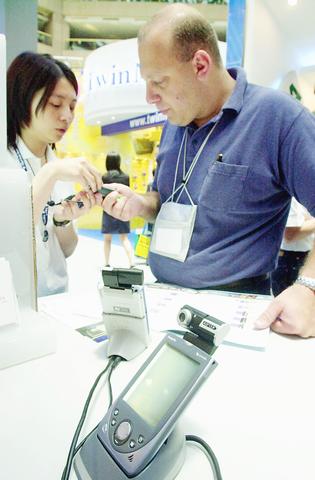Take a walk around Computex Taipei 2002 and it's easy to see why Palm and Handspring are having such a hard time turning a profit on personal digital assistants (PDAs) -- a lot of Taiwanese companies are making them too, and for much cheaper.
Even companies not associated with manufacturing electronics products, such as CMC Magnetics Corp (
Other companies, like Compal Electronics Inc (

PHOTO: GEORGE TSORNG, TAIPEI TIMES
Both companies produce PDAs in China, with designing and engineering in Taiwan. In both cases, these companies are able to drive prices down. Taiwanese engineers cost far less than their counterparts in the West or Japan, and few places in the world offer lower cost manufacturing than China.
Compaq Computer Corp, now taken over by Hewlett-Packard Co, saw the writing on the wall years ago and hired High Tech Computer Corp (
A factory in China churns out the iPaqs, while labs in Taiwan help with the design work. The company's sales have increased an average of 253 percent each of the past three years.
Last year, High Tech's net sales reached NT$15.5 billion and its earnings per share NT$7.62, a whopping 530 percent increase over the previous year.
Palm may be trying the same kind of partnership with Acer Inc's (宏電) spin-off company, Wistron Inc (緯創資通). Acer is marketing a Chinese-language version of the Palm software with its own PDA in China and Taiwan, while Wistron -- the former manufacturing arm of Acer -- is making PDAs for Acer.
The Market Intelligence Center in Taiwan forecasts the production value of Internet appliances, including PDAs, Web Pads and other hand held computers, will reach as high as US$50 billion by 2006, up from US$23.2 billion in the year 2000.
Some analysts are questioning whether the PDA business will ever reach the profit margins attained in 2000, because hardware is becoming dominated by low-cost producers entering the market.
Palm Inc said in a statement last week that slow sales would push it to another loss in the quarter ending May 31 and predicted another loss would follow. The company has seen four straight losing quarters already.
Palm said it is on target to split the hardware and software sides of its business into two separate companies by the end of this year in an effort to avoid competing with its own customers.

Leading Taiwanese bicycle brands Giant Manufacturing Co (巨大機械) and Merida Industry Co (美利達工業) on Sunday said that they have adopted measures to mitigate the impact of the tariff policies of US President Donald Trump’s administration. The US announced at the beginning of this month that it would impose a 20 percent tariff on imported goods made in Taiwan, effective on Thursday last week. The tariff would be added to other pre-existing most-favored-nation duties and industry-specific trade remedy levy, which would bring the overall tariff on Taiwan-made bicycles to between 25.5 percent and 31 percent. However, Giant did not seem too perturbed by the

Foxconn Technology Co (鴻準精密), a metal casing supplier owned by Hon Hai Precision Industry Co (鴻海精密), yesterday announced plans to invest US$1 billion in the US over the next decade as part of its business transformation strategy. The Apple Inc supplier said in a statement that its board approved the investment on Thursday, as part of a transformation strategy focused on precision mold development, smart manufacturing, robotics and advanced automation. The strategy would have a strong emphasis on artificial intelligence (AI), the company added. The company said it aims to build a flexible, intelligent production ecosystem to boost competitiveness and sustainability. Foxconn

TARIFF CONCERNS: Semiconductor suppliers are tempering expectations for the traditionally strong third quarter, citing US tariff uncertainty and a stronger NT dollar Several Taiwanese semiconductor suppliers are taking a cautious view of the third quarter — typically a peak season for the industry — citing uncertainty over US tariffs and the stronger New Taiwan dollar. Smartphone chip designer MediaTek Inc (聯發科技) said that customers accelerated orders in the first half of the year to avoid potential tariffs threatened by US President Donald Trump’s administration. As a result, it anticipates weaker-than-usual peak-season demand in the third quarter. The US tariff plan, announced on April 2, initially proposed a 32 percent duty on Taiwanese goods. Its implementation was postponed by 90 days to July 9, then

AI SERVER DEMAND: ‘Overall industry demand continues to outpace supply and we are expanding capacity to meet it,’ the company’s chief executive officer said Hon Hai Precision Industry Co (鴻海精密) yesterday reported that net profit last quarter rose 27 percent from the same quarter last year on the back of demand for cloud services and high-performance computing products. Net profit surged to NT$44.36 billion (US$1.48 billion) from NT$35.04 billion a year earlier. On a quarterly basis, net profit grew 5 percent from NT$42.1 billion. Earnings per share expanded to NT$3.19 from NT$2.53 a year earlier and NT$3.03 in the first quarter. However, a sharp appreciation of the New Taiwan dollar since early May has weighed on the company’s performance, Hon Hai chief financial officer David Huang (黃德才)